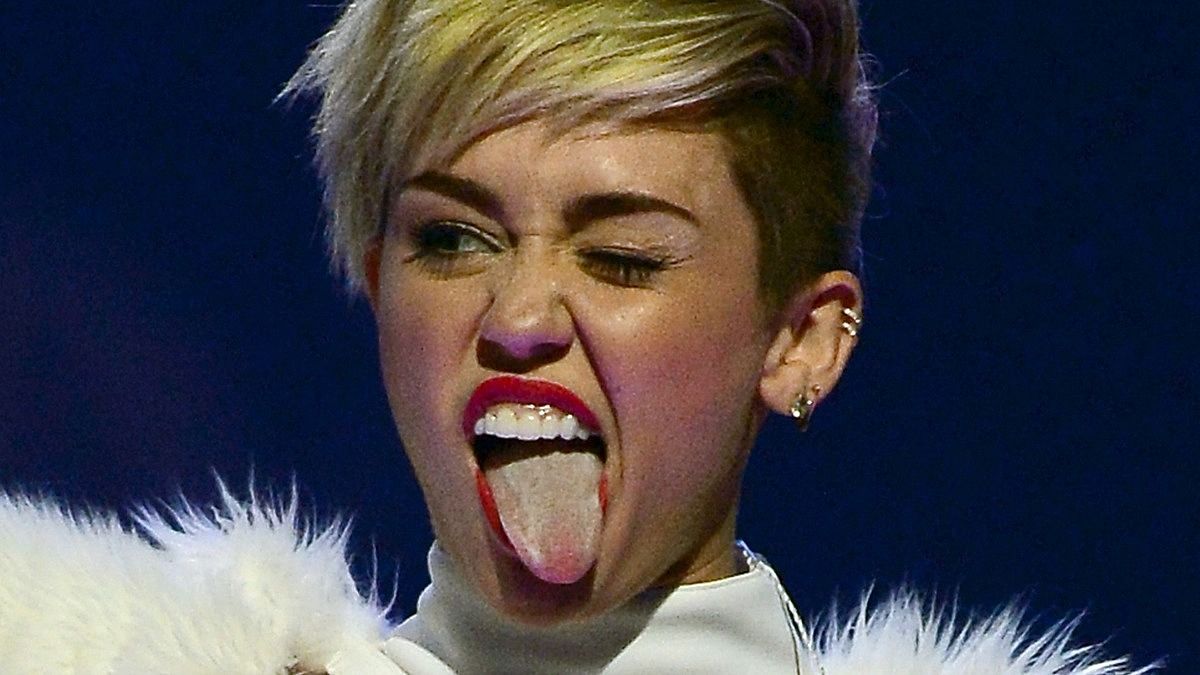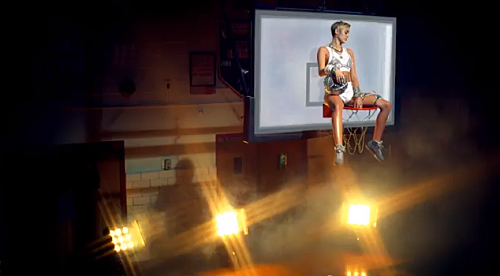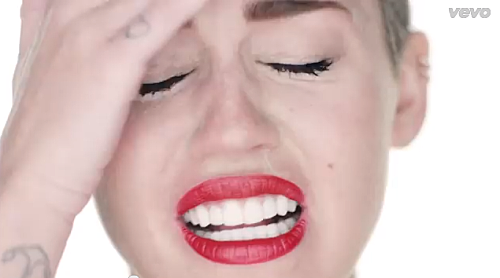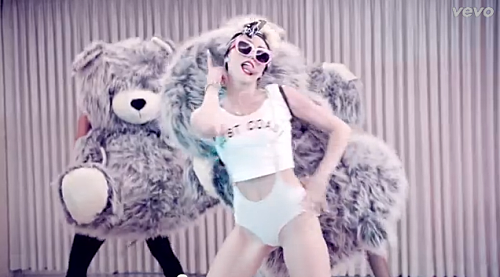We Can't Stop
We just can't get over Miley Cyrus, except for when we do. But before she fades from memory and everyone starts baying for what's next, let's remember what was so interesting, and so taboo about how she handled sex and self-image. Frances Libeau (fka Claire Duncan) investigates.
We're about to stop talking about Miley Cyrus. We’re sick of it. The past month has seen Facebook feeds rife with Cyrus-related posts and links (most of which are non-committal as to whose-side-of-what-fence; they’re more about making some kind of contemporary cultural reference than positing anything relevant). There are witty one-liners and endless memes: all attempting to draw attention to the areas Miss Cyrus is occupying across many webs - various news networks, social media, water-cooler conversation and here, on a ‘respectable’ site that does ‘think-pieces’ on ‘pop culture’. We're past boiling point with Miley, and the water is evaporating. Even last week's outrage - Cyrus smoking what may or may not have been a cartoon-huge blunt at the MTV European Music Awards - felt almost cosy and familiar, the Euro-Disney equivalent of the VMA thrillride.
This is the last thing you want to read, and this is what I’m here to do – talk to you about Miley. I want to know why it is that in a the realm of entertainment and pop culture, this particular young woman became the subject of such acrimonious outrage – and why it is that she’s shortly destined to fade from headlines like a roman candle running out of heat and light.
Sexualised young woman performing pop music is nothing new. (NB: Madonna, ‘Justify My Love’, 1990.) Singers since day dot (and as celebrities of sort, certainly for more than a century) have worn risque clothing and performed provocatively as entertainment. Miley’s recent videos and her turn at the VMA Awards is clearly a culural event, but there are plenty of events that might still be able to classified as ‘recent history’, or at least watercooler moments, on a similar par - Britney Spears’ nude sparkle onesie; Janet’s nip-slip at the SuperBowl; Mads and Brit having a mad pash on stage at the VMAs.
Miley knows it, too: “I don’t pay attention to the negative. How many times have we seen this play out in pop music? Madonna’s done it.. Britney’s done it”, she said to MTV. Of course, this doesn’t make the objectification of women or the exchange of money for ‘bodies’ acceptable on a blanket level – what we get instead is a complex array of double standards determining the various forms that feminine sexuality can acceptably take on (according to the shared values of the industry, media and consumers) without becoming OTT, WTF, NSFW or otherwise venturing into the realm of the grotesque or parody. There's an arc through pop history that charts those who venture into the transgressive and dangerous – Grace Jones, Madonna, Britney, Gaga – and at every stage, audiences and commentators alike are compelled to draw a moralising line in the sand before moving on to something similarly freakish. And we all move on awfully easily, without ever stopping to ask why we are repulsed by a tongue or a twerk.
What’s new here – and perhaps what makes Miley Cyrus' recent transformation and transgressions so challenging for people to stomach, why they’re getting a different reaction from, say, Katy Perry or Ke$ha – is that she’s doing it with a sense of humour. In the world of mainstream pop, we’re used to seeing what’s slick, not what’s ridiculous. We’re used to sexual intimacy and sexuality being taken seriously (if superficially), not being mocked. It’s not the fact that Miley is flaunting her breasts and her ass that inspires the spitting vitriolic torrents - nor is it simply that she’s sticking her tongue out and prancing around with the LA Bakers dressed as twerking teddy-bears. It’s that she does both. People love to see a scantily clad woman on a screen, so long as she doesn't waggle her tongue at the camera or mock masturbate with giant foam hand. This pisses people off. Why? She creates a space of excess. The point of excess is to shock; to swamp; to be gratuitous and by virtue of its gargantuan presence, ridiculous. Miley climbing out of a giant robo-cop laser-eyed teddy-bear? Glorious. Excessive. Embracing.
Sex and humour are not two things that often collide in pop music performed by women, and we’re not coping. Instead, Miley’s out of control. She’s a train-wreck waiting to happen. She’s lost the plot, a child-star navigating that awkward phase where she’s struggling to discover herself and her own sexuality. She’s ‘nasty’, abhorrent, offensive, repellent. It feels like it’s been some time since a performer was as loathed, despised and ridiculed as Miley. Concerned elders world-wide express dismay and tsk-tsk at her silly nonsense - Elton John, Annie Lennox, and most loudly and to the greatest response, Sinead O’Connor.
Counter-arguments have sprung up far and wide across the web, feminist and pop culture critics scrambling to drop in their two cents – Miley's not a victim of the system; nor is she able to make a decision without the influence of history on her shoulders. She's allowed to wear nothing, but shouldn't she wear something? If she's mates with Terry Richardson, so be it, she can pick her friends, but would you let your kid...? Where's Miley's Mum? What is Miley's mum doing with her tongue?
Sexuality is always messy, complex and fluid. But a society that does not encourage varied and individual approaches to sexuality (and worse, refuses to laugh at itself) can only result in shaming and censorship while perpetuating and even promoting the normalised facets of sex - taboos without the taboos. It effectively sets a new consensus line for what gets perceived as vulgar - and consequently, tragic. Because to go flaunting these codes, something must have messed you up big time.
Miley addressed the dichotomy in her Rolling Stone interview last month, reflecting on her reception in American popular culture.
"America is just so weird in what they think is right and wrong… Like, I was watching Breaking Bad the other day, and they were cooking meth. I could literally cook meth because of that show. It's a how-to. And then they bleeped out the word 'fuck.' And I'm like, really? They killed a guy, and disintegrated his body in acid, but you're not allowed to say 'fuck'?”
The recent censorship of artist Petra Collins' work is worth pointing to here (her Instagram was deleted by administrators after she posted this shot of herself in a bikini with pubic hair visibly protruding). Though fine art hasn’t granted Collins the same stature as Cyrus, it does serve to highlight the larger problem that women across the board are still struggling for dynamic and confronting sexualities to be accepted.
Speaking more specifically about her performance at the VMAs; Miley said “I wasn’t trying to be sexy”. Again, in the recent MTV feature Miley: The Movement -- “I’m coming out in pigtails coming out looking like a giant adult baby basically -- that’s obviously funny. If I wanted to do a raunchy adult sex show I wouldn’t have been dressed as a damn bear.”
What strikes me as odd is that no one seems to be asking why it is that Miley has been singled out as being a subject for so much discussion. Why not Rihanna, who smokes, drinks and booty-shakes her way through most videos? Part of the reason people seemed to (briefly) care so much is to do with transformation – to see a person actively manipulate their image invokes a nostalgia and a yearning for the 'old them', the 'authentic' figure they presented before. Personally, I’m surprised at the surprise factor. Is it that unreasonable to consider that perhaps Miley wants to get a little wild since Hannah Montana was murdered? That a 20-year-old girl wants to cut her hair and dress up kinda weird? Remember, she posed almost topless for a Vanity Fair shoot at the age of 15 and was filmed at 17 taking a hit from a bong (reportedly legal salvia), in spite of her teen sweetheart image. This isn’t an overnight transformation – but like I said, we’re inclined to think in events.
Miley’s sexuality does not neatly align with the kind of seductive, passive chanteuse femininity that someone like Lana Del Ray presents, nor does she present the womanly assertion of Beyonce. Rihanna might come closer, though she occupies a different space in terms of femininity altogether, regularly code-switching from ghetto-glam to Barbadian goddess to high-class starlet. Her most recent video for ‘Pour It Up’ is explicit on a level Miley hasn’t even touched, yet doesn’t seem to have invoked much response beyond a courtesy NSFW for the watercoolers. But after watching Rihanna twerk it out in a thong (on all fours; upside down in a chair…) while strippers go up and down that pole in a dimly lit room, a question needs to be asked. If Miley were to twerk more ‘seriously’ (i.e. not in a unicorn suit or with a team of giant teddy-bears) would she then be more acceptable to the public? Could it be that she’s taking these heavily sexualised elements of pop culture and is having a good time, poking fun from the inside out? What is being exploited here is not Miley herself, but the values of femininity constructed around female pop performers. Her approach is not to resist, hold back, cover up – but to embrace, rush forward, and expose all.
“Every other girl is so serious – like, this is my moment on the red carpet, I'm in my ball gown, looking pretty. There's something empowering about what I'm doing right now... Because there's not one thing that defines what beauty is.”
That’s her in Rolling Stone again. What seems to be part of the issue is the fusion of sexual content with humour and the grotesque - the severing of false fingers in the video for “We Can’t Stop” sees a flood of viscous pink goo ooze across a counter. As a female entertainer, Miley’s image and performance style is rubbing up against the issue of sexualisation itself; a kind of visual parody of pop music that happens to accompany great pop music.
Another thing that really separates her from Britney, Rihanna and Beyoncé (and contributes to the public resistance) is her inability to dance. In 'We Can't Stop', she dances like a girl at a club. She dances like a drunk at a party. The video for 'Wrecking Ball' sent people spiralling. In the final cut, no effort was made to hide the tanlines on Miley's naked body. Terry Richardson’s one-take cut is vulnerable and bold, showing a close-up of Miley’s face, strings of spit hanging between her teeth, her nose running ungracefully onto her upper lip as she cries. A comment from ‘irishdrivingbloopers’ on the inevitable mash-up of ‘Wrecking Ball’ and ‘Nothing Compares 2 U’ offered a helpful and deeply moral simile: ‘it looks like she just gargled with semen with all the sticky shit going on in there. Sineads [sic] mouth however is as clean as could be’.
In the public eye, sexy can only mean slick, synchronised, seamless. Miley is telling a different story - one in which she reminds us of ourselves; our imperfections and our contradictions - and we are terrified. What's frustrating is that this feels like a genuinely teachable moment in pop music. Sinead's 'vulnerable' video face is soft and coy. Miley's is desperate and snotty. I can't speak for you, but I know what I look like when I cry.
Miley's grotesque, functioning in a space of excess that people do not know how to handle. She is delivering more than we can cope with. “I know what I'm doing. I know I'm shocking you”, she says. We are used to celebrities hiding, covering themselves in private, a sense of shrouding, even shyness. Miley doesn’t tease; she’s laid it all out for the magazines to pick up and for us to hold in our hands and ogle with our eyes. Via her videos, Instagram and social media, Miley has given unfettered access to her body as well as her voice -- something that the media and fans hungrily seek out regardless. The only surprise on offer is that she might not be the potential car-crash people think she is. In a private message she reads out loud from Pharrell (in the MTV documentary Miley: The Movement): “You’re not a train-wreck. You’re the train pulling everyone else along.” Physically speaking, she appears fit and muscular, the self-possession she displayed recently hosting on Saturday Night Live suggesting that she’s got things wrapped up pretty tight. Unfortunately, this means her stab at Sinead’s mental health was particularly below the belt. Yet while O’Connor should be applauded for speaking up about something she feels strongly about - and the very real issue of objectification in pop music - Miley seems like the wrong target. Frankly, I find the power of Disney-sanctioned family content to instill princess complexes in little girls a lot more damaging than the surreal image of a short-haired woman in a thong leotard that seems to be on backwards[4] . Again, it is the transformation that creates discomfort; a quick glance over the shoulder at the ghost of Miley-past a shimmering mirage of long-haired wholesomeness, while the reality (tacit projection of pink-pop-princess feminine ideals) is solidly problematic. Miley Stewart/Hannah Montana's influence was widespread and largely unchallenged; she presented a figure that fitted comfortably into our normative expectations of what young women are/could be like. Perhaps it is this template simplicity that – while not only being pretty boring – helps to breed a culture of unthoughtful criticism, blanket rejection and mockery of modes of femininity strive for a space beyond the one sustained by characters akin to Hannah Montana.
There’s another ominously large and noisy player so far absent in this argument -- one seized upon by Sinead O’Connor along with others as purest evil at work; and just so things don’t get too personal, it’s one that relieves Miley and all other young pop-stars of responsibility, autonomy and independence: the ‘i-word’ – industry. We love the i-word as a means of explaining away an unprecedented success (Lorde). We love the i-word as a means of justifying unpredictable or unexpected behaviour. Miley has cut her hair (‘ALL THIS IS CLEARLY A CRY FOR HELP ’; deeann, August 14, 2012 20:27), Miley can’t keep her tongue in her mouth (‘I just wanted to say that whoever photoshopped a clean tongue on Miley deserves a beautiful golden medal of valor and excellence’; Wanted, 25 September, 2013, 10:58), Miley is twerking in a unicorn suit (‘she dosent have a butt for it,my grandma can do better’; ItsNouf, August 2013). Miley can’t do enough, so she keeps doing more.
In O’Connor’s follow-up interview to her open letter she claimed that the industry itself is corrupt and that regardless of what she says, Miley is no longer in control of her decisions. While I’m neither a purveyor nor an unconditional supporter of the pop music industry myself, Sinead’s spirit of motherliness surprisingly assumes that outlandish and difficult sexuality (what Sinead herself strived for at her peak) must be mere puppetry, controlled by record executives and a PR team. I would argue to the contrary – prior to recording Bangerz, Miley split from both her label and manager -- “I really wanted to stay with my manager, but I feel like this… would have scared them. I just don't think they would've had as much faith in what I'm doing” – teaming up instead with Britney’s manager Larry Rudolph. As for assuming that the notorious Richardson is in part responsible for Miley’s hyper-sexual image; Miley’s since revealed the now infamous mallet-lick in the Wrecking Ball video was her own ad-lib: “They didn't tell me it was painted, so I was licking it, and they were like, 'Don't lick that!’” (Rolling Stone.)
While O’Connor makes a valid observation that the visuals distract from the quality of the music, the claim that the music is being ‘murdered’ assumes a nostalgic and clearly anachronistic view of the past. O’Connor ignores the way the music industry has been structured for decades and the radical pathways opening in the distribution of music today. ‘Folk’ music doesn’t sound like it did in the 1960s. ‘Punk’ music doesn’t sound like it did in the ‘70s and ‘80s. O’Connor also made the mistake of using David Bowie as an example of a ‘true artist’ - one who was – yup – sexually transgressive and radical for his time. What's more, Miley's had a lifetime of this biz already and is certainly no stranger to its wiles and woes, having grown up with Achy-Breaky Billy and co. She knows no other world.
As unthinking outrage and distaste is fading into collective exhaustion and boredom (at least until the next tongue is poked or the next nipple flashed), perhaps we'll see Miley stumble and fall and shakily stand agai, a la her Disney childstar counterpart Britney Spears, though it’s familiar headline fodder. If that’s what everyone’s waiting for, it's a shame about the sober professionalism and self-deprecating humour Miley displayed on SNL last month – that was a real wet blanket for her crazy-girl image; not to mention her breath-taking, self-possessed performance of ‘Wrecking Ball’ wearing – what's that? – a baggy t-shirt (albeit sans pants, Rihanna-style). So, as for the crash and burn? It seems much more likely that Miley’s performances will, as mentioned on on the show, see the demise of American civilisation as we know it. Sarcasm aside, her new music speaks for itself. Shock factor fades; good songs do not.
We don’t know how to deal with Miley. She’s hard to digest. She’s funny, sexy, gross, stupid, even smart. She talks about creating a movement, about taking over the world, then in the same breath pulls a ‘why so serious?’ When she cuts her hair she’s called butch and compared to Ellen Degeneres (pure homophobia; I for one would be flattered). When she loses weight, she’s on drugs. When she sticks her tongue out, she’s got candida. There haven’t been many moments in recent pop history when people have been confronted with female sexuality as big, broad, weird and far-reaching as this, and certainly not accompanied by hard-hitting, well-produced pop music. The image of a wrecking ball has not felt this apt for some time.




